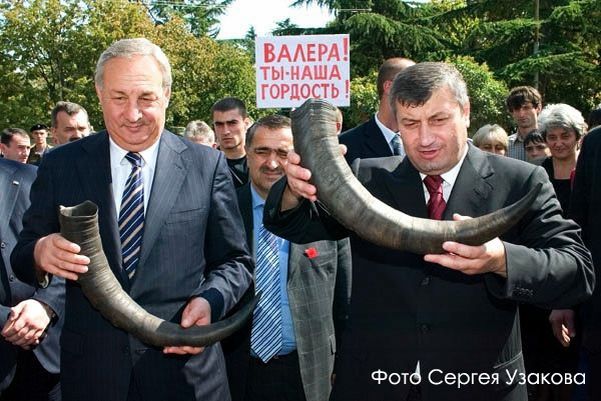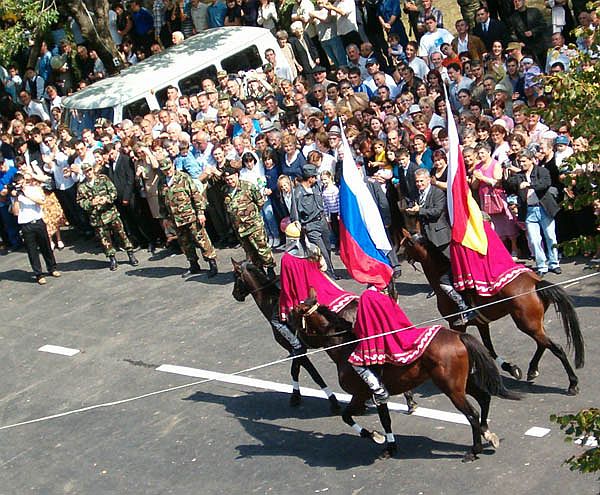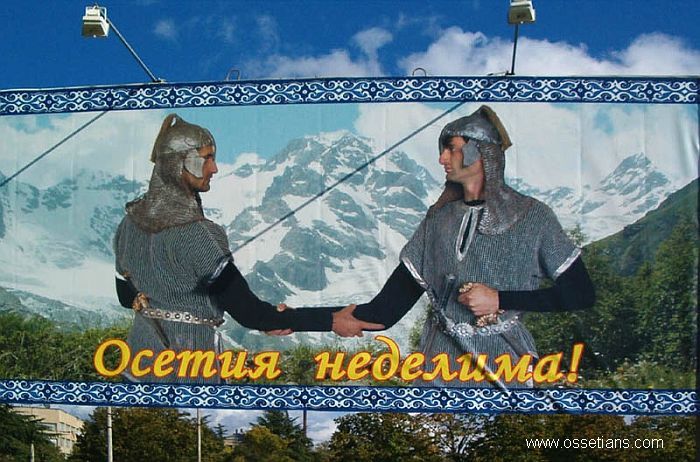Caught Between Russia And Georgia, South Ossetia Rift Widens
In November 2006, the breakaway South Caucasus region of South Ossetia held two sets of simultaneous presidential elections. Neither was recognized internationally, but both have left the region with the very real impact of two parallel, and mutually exclusive, leadership structures that may make the resolution of its breakaway status even less likely. One, backed by Moscow, reinstated the region's de facto incumbent, separatist leader Eduard Kokoity. The second, organized with Tbilisi's unofficial support, brought in an "alternative" candidate, former separatist Prime Minister Dmitry Sanakoyev, to head a new, pro-Georgian provisional administration. That ballot, held in regions of South Ossetia populated predominantly by ethnic Georgians, was accompanied by a referendum in which a vast majority of residents voted in favor of a confederation arrangement with Tbilisi.
Belgian Foreign Minister Karel De Gucht, who at the time of the vote was serving as the chairman-in-office for the Organization for Security and Cooperation in Europe, was among the Western officials to express his displeasure with the duelling votes. "The so-called elections," he said, "increase tensions and divisions at a time when the sides to the Georgian-Ossetian conflict should be devoting all efforts to stabilizing the situation and moving forward the negotiating process." Georgian authorities, however, have continued to maintain at home and abroad that Sanakoyev was the solution to the continued impasse over the breakaway region. Georgian Prime Minister Zurab Noghaideli, addressing the OSCE Permanent Council late last month, claimed the provisional administration now controls "about half" the territory of South Ossetia.
 Presidents of Abkhazia and South Ossetia keeping the centuries long brotherhood
Presidents of Abkhazia and South Ossetia keeping the centuries long brotherhoodThe OSCE is there to promote negotiations between the conflicting parties, with a view to reaching a peaceful settlement of the conflict. It also has monitors on the ground who gather information on the military situation in the conflict zone and maintain close contacts with the the Russian-Georgian-Ossetian Joint Peacekeeping Force. Noghaideli also went on to describe the separatist government as "falling apart," and praising Sanakoyev's team as choosing "the path of peace and leading South Ossetia forward." He added that "tens of thousands" of local residents are expressing "the very same desires."
Scattered Villages
It's a bold claim in a region whose estimated population -- a mix of Georgians and Ossetians -- stands at just 70,000. Western diplomats, moreover, say it is impossible to corroborate. Former Georgian Interior Minister Irakli Okruashvili, who aggressively sought to bring Tskhinvali back into the Georgian fold during his time at the post, recently described Sanakoyev as a "caricature" who has been unable to woo significant numbers of Ossetians from the separatist leadership.
Sanakoyev's provisional administration is headquartered in a predominantly Georgian village located in a part of South Ossetia that is under Tbilisi's jurisdiction. He has said the settlements under his control are home to mainly Georgians but boast a substantial Ossetian minority of 8,000. Noghaideli upped the ante in his remarks to the OSCE, saying that figure is nearly twice as high. Russia and South Ossetia's separatist authorities have both dismissed Sanakoyev's team as a puppet administration that has no mandate to speak on behalf of all Ossetians. Moscow also says that what is calls the "Sanakoyev factor" is seriously complicating status negotiations involving the Joint Control Commission (JCC), the four-party body that continues to supervise the implementation of the 1992 cease-fire agreement that ended the Georgian-Ossetian conflict.
 Celebrating 15 years of South Ossetian independance
Celebrating 15 years of South Ossetian independanceThe JCC, which comprises delegates from Russia, Georgia, and North and South Ossetia, has had little luck finding points of compromise or agreement on questions like the establishment of confidence-building measures and the demilitarization of the conflict zone. To Russia's mind, this is largely the fault of Georgian initiatives like the provisional government. Tbilisi in turns blames the commission's purported inefficiency on Russia's continued support to the separatist government. Following an inconclusive commission meeting last month, Russia's chief negotiator, Yury Popov, said the emergence of Sanakoyev had had an "irritating effect" on the security situation in South Ossetia and was hampering the negotiation process. He also criticized Tbilisi for obstructing talks with demands like its insistence that the separatist government establish contact with Sanakoyev.
Growing Rift
To be sure, the creation of the provisional administration has made separatist authorities increasingly nervous and has negatively affected relations within the region. Earlier this year, Georgian and Ossetian villagers squared off against each other on several incidents in a fight over access to the region's water supplies. OSCE officials note that the rift between the conflict zone's divided communities "is getting wider and wider every day," and that the vast majority of Ossetians do not trust Georgian authorities. They also say the existence of two antagonistic administrations, located just a few kilometers from each other in a region that has yet to be demilitarized, has only intensified the risk of direct confrontation.
Another fallout of the "Sanakoyev factor" is that it has seriously complicated the OSCE's relations with the Kokoity administration, thus putting the only international presence on the ground at risk. The separatist authorities last month blocked Lithuanian water engineers from entering Tskhinvali as a protest against official contacts between Vilnius and Sanakoyev. Lithuania, which has pledged 100,000 euros to rehabilitate Tskhinvali's water supply network as part of the OSCE-led Economic Rehabilitation Program for South Ossetia, is now threatening to fund projects only in Sanakoyev-controlled areas.
 Ossetia is indivisible
Ossetia is indivisibleThe creation of the provisional administration has for the most part been met with embarrassment by the international community. Although the pro-Georgian leader traveled to Brussels this summer for informal talks with members of the European Parliament, only a few individual countries have taken the step of to making official contact with Sanakoyev. In April, the European Union's special representative for the South Caucasus, Peter Semneby, exchanged a few words with Sanakoyev on the sidelines of a NATO Parliamentary Assembly seminar in Tbilisi. But Semneby has so far refrained from official contacts with Sanakoyev and has made it clear that the EU will maintain ties with the separatist authorities.
British diplomat Roy Reeve, who until recently headed the OSCE mission to Georgia, was at odds with Tbilisi over Sanakoyev, arguing that engaging in a dialogue with the head of the provisional administration risked putting the organization's regional operations at risk. Whether Reeve's successor, Finnish diplomat Terhi Hakala, will follow the same nonengagement policy is unclear. The OSCE expects Finland's upcoming chairmanship of the OSCE to refocus attention on South Ossetia and other post-Soviet frozen conflicts. But Helsinki's stance on Sanakoyev remains muted. Sanakoyev traveled to Finland with Saakashvili last month, but it is not clear if he was invited to meet with Finnish officials -- or if so, at what level.
Source: http://www.rferl.org/featuresarticle...91841136e.html
In related news:
Source: http://www.panarmenian.net/news/eng/?nid=24201&page=4
Abkhazian Deputy Defense Minister: we will be side by side with South Ossetia and Karabakh
If something happens in South Ossetia or Karabakh we will be by their side, Abkhazian Deputy Defense Minister Gary Kupalba said when addressing the panel of the permanent coordination council of Cossack atamans in Yerevan. He voiced assurance in peaceful resolution of conflicts in the region and in triumph of right of nations to self-determination. For his part, council’s deputy chairman Sergei Madatyan said that a monument to his renowned ancestor, hero of 1812 war Valerian Madatov will be erected in Yerevan and NKR in the near future, IA Regnum reports.
Source: http://www.panarmenian.net/news/eng/?nid=24201&page=4


No comments:
Post a Comment
Dear reader,
New blog commentaries will henceforth be posted on an irregular basis. The comment board however will continue to be moderated on a regular basis. You are therefore welcome to post your comments and ideas.
I have come to see the Russian nation as the last front on earth against the scourges of Westernization, Americanization, Globalism, Zionism, Islamic extremism and pan-Turkism. I have also come to see Russia as the last hope humanity has for the preservation of classical western/European civilization, ethnic cultures, Apostolic Christianity and the concept of traditional nation-state. Needless to say, an alliance with Russia is Armenia's only hope for survival in a dangerous place like the south Caucasus. These sobering realizations compelled me to create this blog in 2010. This blog quickly became one of the very few voices in the vastness of Cyberia that dared to preach about the dangers of Globalism and the Anglo-American-Jewish alliance, and the only voice emphasizing the crucial importance of Armenia's close ties to the Russian nation. Today, no man and no political party is capable of driving a wedge between Armenia and Russia. Anglo-American-Jewish and Turkish agenda in Armenia will not succeed. I feel satisfied knowing that at least on a subatomic level I have had a hand in this outcome.
To limit clutter in the comments section, I kindly ask all participants of this blog to please keep comments coherent and strictly relevant to the featured topic of discussion. Moreover, please realize that when there are several "anonymous" visitors posting comments simultaneously, it becomes very confusing (not to mention annoying) trying to figure out who is who and who said what. Therefore, if you are here to engage in conversation, make an observation, express an idea or simply insult me, I ask you to at least use a moniker to identify yourself. Moreover, please appreciate the fact that I have put an enormous amount of information into this blog. In my opinion, most of my blog commentaries and articles, some going back ten-plus years, are in varying degrees relevant to this day and will remain so for a long time to come. Commentaries and articles found in this blog can therefore be revisited by longtime readers and new comers alike. I therefore ask the reader to treat this blog as a historical record and a depository of important information relating to Eurasian geopolitics, Russian-Armenian relations and humanity's historic fight against the evils of Globalism and Westernization.
Thank you as always for reading.